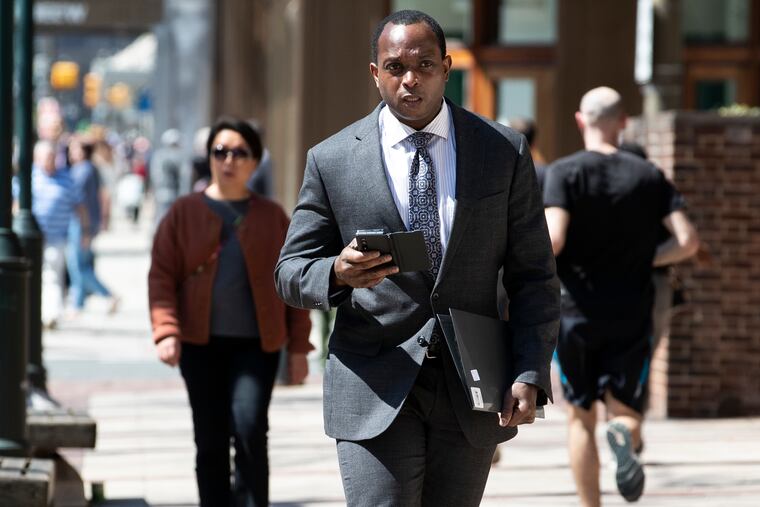Ex-Philly Treasurer Christian Dunbar sentenced to six months for lying about marriage and failing to file taxes
Dunbar, 42, said he took ‘full responsibility’ for his actions before a federal judge

When Christian Dunbar fled civil war in his native Liberia and arrived in the United States, he quickly ticked the boxes of the American dream.
A scholarship to a major university. A captain’s position on the school football team. A marriage, a house, children, and eventually a top role in city government.
Then, in a twist in that his defense team admitted was a “gut punch,” Dunbar tainted that legacy with fraud.
Dunbar — who served as Philadelphia’s treasurer until his 2020 arrest — appeared in federal court Tuesday and was sentenced to six months in prison after admitting he fraudulently obtained U.S. citizenship by lying about his marital status and failed to file his personal income taxes while in office.
In addition to his prison term, Dunbar was ordered by U.S. Judge Cynthia Rufe to pay a fine of $10,000, complete back payment of $33,232 he owed to the Internal Revenue Service, and agree to three years of supervision and financial monitoring.
Dunbar’s citizenship to the United States will also be revoked.
Dunbar and his lawyer, Brian McMonagle, declined to comment after the hearing.
Dunbar’s mother, second wife, and close friends took turns testifying about the 42-year-old’s track record as a dedicated father and steadfast leader in Philadelphia’s African community, as part of an emotional appeal to keep him from serving the suggested 10 to 16 months in jail.
Rufe, recognizing Dunbar’s nonprofit work during the two-plus years since his arrest, agreed that the sixth-month sentences — one for each of the two charges — would be served concurrently.
But she told Dunbar, “You can’t succeed in anything until you fully recognize how not to go wrong again.”
Dunbar took office in 2019 after Mayor Jim Kenney tapped him for treasurer, bumping him up from the deputy treasurer position he’d held for three years.
Kenney has not commented publicly on the case, and an internal probe found no evidence that Dunbar abused his official duties.
In the city’s top financial position, Dunbar oversaw an investment portfolio worth $4 billion as well as Philadelphia’s bank accounts, debt obligations, and municipal bonds.
Considering that tenure, Rufe expressed disbelief that Dunbar could have unknowingly failed to file income taxes in 2015, 2016, and 2019 — two of those years while he was in office.
Dunbar’s financial honesty had previously been called into question when he was alleged to have embezzled $15,000 from clients while he was a financial adviser at Wells Fargo, though that charge and another related to false tax deductions were dropped after Dunbar’s guilty plea last fall.
What drew much of Rufe’s attention Tuesday were Dunbar’s faulty claims about his first marriage to a woman he met while attending Temple University in the early 2000s — a woman who would go on to sponsor Dunbar for a green card.
U.S. Prosecutor Josh Davison called Dunbar’s first union “the definition of a sham marriage,” alleging that Dunbar was living with his current wife, Fatoumata Ndiaye-Dunbar, as early as 2006 and reiterating that he had married her in a ceremony held in Senegal while still married to his first wife.
Davison also questioned Dunbar’s insistence that his marriage dissolved for personal reasons in 2013 — the year he married Ndiaye-Dunbar — although his divorce was not initiated until 2017, shortly after he obtained U.S. citizenship.
The prosecutor acknowledged that it’s “gut wrenching” when someone’s U.S. citizenship is stripped, but stressed that Dunbar’s new status as a legal permeant resident is not too different than the former.
“Adjudicators hear about 10 applications a day,” Davison said of the U.S. citizenship process. “A case like this only makes them second-guess who is coming before them.”
Dunbar expressed regret for filing for citizenship under those circumstances. Speaking of his taxes, he told Rufe he believed the IRS already had his information from his W-2 form filed with the city, and he noted that he had filed taxes for family members during the same period.
Ultimately, he said he had no excuses.
“I want to thank my family for all their support my colleagues my friends and all the well wishers,” Dunbar said. “A long time ago I learned that you cannot have responsibility unless you taken responsibility, and I take full responsibility for my actions.”
In revoking Dunbar’s citizenship, Rufe said that was not only mandatory, “but probably the correct thing to do,” especially given what she called her valued ability to naturalize citizens as a federal judge.
As for his taxes, Rufe’s judgment was clear.
“Everyone else has to file by April 15th,” Rufe said. “Why not you?”